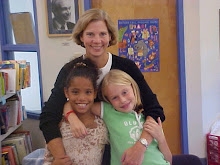I am so excited!!!! The report today in the New York Times of scientists hearing the sound of two black holes colliding a billion light-years away, that proves Einstein's theory of gravitational waves, is just phenomenal!
It took one hundred years, including 40 years of scientific exploration and $1.1 billion investment by the National Science Foundation, to test and prove what Einstein predicted in 1915.
Using two 2.5 mile long "antennas" ending with mirrors hung with glass threads, the LIGO team of physicists detected changes smaller than one ten-thousandth of the diameter of a proton. And they recorded it. So you can hear it. That. is. amazing.
The questioning, striving and passion to continue this work over time; the dedication to an idea and the curiosity and determination to follow through; the serendipity, cooperation, invention and creativity of a team of physicists working together - it is the perfect example of what we are teaching our students to do and be. Our school's mission - our equation for education - is to inspire curiosity and a passion to achieve and to cultivate purposeful action. This equation has lead to exciting and wonderful achievements by so many of our graduates.
I love this phenomenal example of the quest to answer questions about the nature of the universe. I hope you will be as inspired by it as I am!









